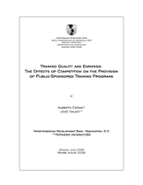Training Quality and Earnings: The Effects of Competition on the Provision of Public-Sponsored Training Programs
Date
Aug 2006
This paper evaluates the effectiveness of market-based approaches in the provision of public-sponsored training programs. In particular, we study the link between training quality and labor earnings using a Peruvian program that targets disadvantaged youths. Multiple proxies for training quality are identified from bidding processes in which public and private training institutions that operate for profit compete for limited public funding. Using difference-in-differences kernel matching and standard regression-based approaches, we find that beneficiaries attending high-quality training courses have higher average and marginal treatment impacts. These earnings differentials are larger for females rather than males, and are larger in the medium term rather than in the short run. External validity was assessed by using five different cohorts of individuals over an eight-year period.



